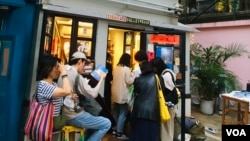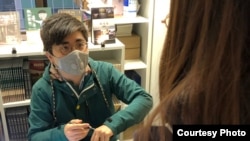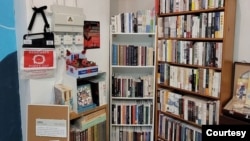Around 50 people gathered on a cool spring evening outside a bookstore at the end of a quiet alley for a book talk by two authors. The books were about travel but the mood was not lighthearted.
The event was the last at Mount Zero, which recently announced it will close by the end of March, after facing a series of warnings from government departments about minor violations, from the use of the alley for book talks to the paving of a small uneven public space in front of its entrance.
“I’m sad. There are fewer independent bookstores in Hong Kong. It’s getting hard for them to exist,” said Raymond To, an artist and frequent visitor.
According to one tally, 40 of Hong Kong’s independent bookstores have closed since 2020, the year Beijing imposed a national security law on the city following widespread and sometimes violent pro-democracy demonstrations in 2019.
While most of the closures were due to a drop in business caused by COVID-19, the economic downturn and a declining interest in reading, at least two have shut down because of what their owners describe as political pressure or a less free environment.
Bookstores that sell politically sensitive content or are run by former politicians, journalists or other protest supporters, are subject to visits by various government monitors, according to the owners.
“A lot of bookshops in Hong Kong have been regularly checked by government departments, not daily but from time to time,” said Raymond Yeung Tsz-chun, co-owner of Hillway Culture, which closed in 2023. “We were checked monthly. This is like political pressure.”
While the government and its supporters credit the Beijing-backed National Security Law with restoring order in the city, others say it has curtailed civil liberties, including purges of politically sensitive books from public libraries.
Independent bookstores are among the few places where people can still find titles missing from libraries and no longer carried by major chains — including those about the pro-democracy movement.
While some bookstores have become community gathering places where people try to come to terms with the changes in Hong Kong, they’re increasingly seen as part of a “soft resistance” to tightening measures that the government sees as necessary to reestablish Hong Kong’s stability.
“With the bookstores remaining, there is room for some liberal discussion. … The Hong Kongers still treat these types of bookstores as a last resort,” said Leticia Wong Man-huen, owner of Hunter Bookstore. “I guess the government also sees this point. They don’t want these liberal thoughts and space for civil society to remain.”
More than 10 government officials, representing various departments or agencies, have visited her bookstore, she said.
“It’s not normal, as we know from different kinds of bookstores or different industries,” said Wong, a former pro-democracy district councilor.
Fire departments would check her store for proper fire extinguishers or blocked escape routes.
Yeung, who had been jailed for protesting on the front line, said Hillway Culture received visits from the Food and Environmental Hygiene Department (FEHD), which issues permits for public events.
“The activities that we held require prior registration, so technically they are not open to the public and do not require a public entertainment license in any sense. But the officers would come anyway once they receive complaints,” said Yeung.
Other bookstores received visits from the Internal Revenue Department, checking to see if they were hiding business earnings.
The frequent visits add challenges to running a bookstore, which is already difficult due to Hong Kong’s high rents, owners said.
“It definitely increased our burden of work … both mental and physical stress; you have to deal with different law sets, because the right to explain rules is in their hands,” Wong said.
The FEHD and Fire Services Department each issued a statement to VOA saying they checked bookstores after receiving complaints about suspected violations. No violations were found in the cases they mentioned.
Despite the challenges, independent bookstores continue to open.
“People want to keep room for civil society and bookstores are a good platform,” Wong said.
Some are finding creative ways to exist, renting a corner from an existing bookstore, restaurant or cafe, selling books in a wet-market stall, or running a mobile operation that pops up in different places.
Lion’s Ink consists of just a few bookshelves inside another bookstore.
Its owner, Dexter Tse, a former history teacher whose book about 7,000 years of Hong Kong history was recently published, said it took only 15 minutes and $32 to register his business.
He hasn’t had any problems because his store sells only history books about Hong Kong and Macao.
“There are certain books we know are dangerous — really, really sensitive — and we will avoid them, such as those with an author who is a prominent political figure or already in jail,” Tse said. “If I can avoid those people, it’s fine.”
Wong’s store still sells titles banned from libraries, such as books about the 1989 crackdown on Tiananmen Square protesters, but she avoids publications carrying the 2019 protest slogans that the government considers seditious.
“I’ll try to not censor, of course, but some books from the cover page or title are already sensitive … I might not sell these books,” she said.
While stores not selling politically sensitive books are left alone, the pressure will likely continue on those that do, especially after another security law was passed this week, raising the penalty for sedition.
Yeung closed his store after his co-owner decided to emigrate.
“I can find a new partner, but I think it’s not a good idea to find a person to face all these struggles we went through in the past few years,” Yeung said.
The owner of Mount Zero, the store that hosted a book talk by two authors, declined to be interviewed but posted on social media that it had faced similar problems.
One of Hong Kong’s most popular independent bookstores, it often hosted talks by politically outspoken authors in the dead-end alley outside, shaded by a 100-year-old banyan tree.
“On weekends, I would come here … to feel the atmosphere,” To, the artist, told VOA. “Here you can read any book you want, books the three bookstore chains in Hong Kong don’t sell.”
He believes independent bookstores serve a need.
“It’s good for like-minded people to have a place like this,” he said.
Bookstores hanging on refuse to write their last chapter.
“I’ll take things one step at a time,” said Wong. “I like books and I like Hong Kong. We have the right to read all sorts of books.”







